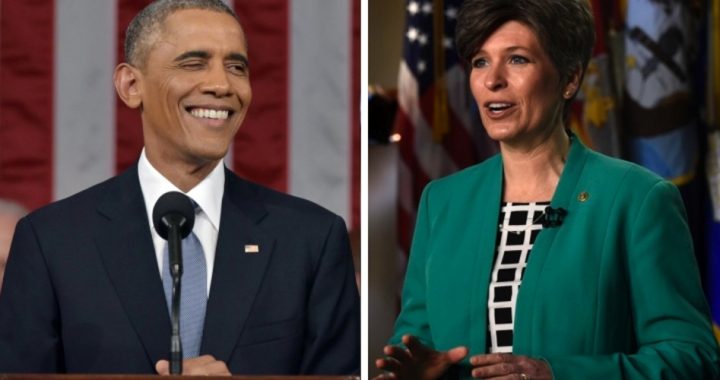
President Obama mentioned immigration only briefly during his 2015 State of the Union address, touching on the highly charged issue only twice in his 6,500-word speech. As if to declare a truce on the topic for the evening, the Republican response to the address, delivered by freshman Senator Joni Ernst of Iowa (shown, right), did not mention immigration once.
Obama’s first mention of immigration was his threat to veto any Republican bill that rehashes “past battles on immigration when we’ve got a system to fix.” This was an apparent reference to recent GOP efforts to, by amending legislation funding the Homeland Security Department, defund the president’s executive actions that halt deportations for millions of illegal immigrants.
Obama’s second immigration reference, reported The Hill, was his challenge to Congress to oppose policies that would result in the deportation of some family members, possibly leaving others behind:
Yes, passions still fly on immigration, but surely we can all see something of ourselves in the striving young student, and agree that no one benefits when a hardworking mom is taken from her child, and that it’s possible to shape a law that upholds our tradition as a nation of laws and a nation of immigrants.
The speech contrasted markedly with Obama’s 2013 and 2014 SOTU addresses. Two years ago, he urged Congress to “send me a comprehensive immigration reform bill in the next few months, and I will sign it right away.”
Some political observers believe that, having giving up on the chances of Congress passing his favored “comprehensive immigration reform” towards the end of the last Congress and going the executive action route, Obama realizes that pressuring Congress further is futile. As noted, however, he still took the opportunity to warn Congress he would veto bills that attempt to undo his grants of amnesty to illegal immigrants.
When it came to the Republican response to the address, Senator Ernst admitted up front that it was not a response at all:
Rather than respond to a speech, I’d like to talk about your priorities. I’d like to have a conversation about the new Republican Congress you just elected, and how we plan to make Washington focus on your concerns again.
As with the president’s address, Ernst seemed to use her time to line up her party’s game plan and establish a track record that will bolster the party’s chances of winning the White House in 2016. While carefully avoiding any mention whatsoever of immigration — an issue that some believe will cause the GOP to lose votes, especially among Hispanic voters — she hit the hot-button phrases such as “stagnant wages and lost jobs” and “job-creation ideas.”
The closest Ernst came to touching the immigration topic was her commitment to “work to correct executive overreach,” an obvious reference to Obama’s use of executive actions to grant amnesty to millions of illegal immigrants.
Whie Ernst did not directly mention immigration in her message, another freshman Republican in Congress, Representative Carlos Curbelo of Florida, took a different turn in the GOP’s Spanish-language response.
Curbelo said members of Congress should work through “appropriate channels to create permanent solutions to our immigration system, to secure our borders, modernize legal immigration and strengthen our economy.” Reaching out to the president, who he said has supported similar ideas, Curbelo said “we ask him to collaborate with us to get it done.”
While the Republican “response” (or lack thereof) ignored immigration, GOP members of Congress are at work writing legislation to address the issue. The bill that has received the greatest number of cosponsors so far (41) is H.R. 191, the “Repeal Executive Amnesty Act of 2015,” sponsored by Representative Robert Aderholt (R-Ala.)
H.R. 399, the “Secure Our Borders First Act of 2015,” has already generated strong criticism — not from Democrats — but from other Republicans. Introduced by House Homeland Security Committee Chairman Mike McCaul (R-Texas) on January 16, H.R. 399 seems like a good bill, with its stated purpose being “to require the Secretary of Homeland Security to gain and maintain operational control of the international borders of the United States.”
Speaking in a video produced to garner support for the legislation, McCaul said:
The southern border of the United States runs almost 2,000 miles long. That is greater than the distance between Chicago and Mexico City. Knowing what and who is coming across our border keeps Americans safe. In the past we’ve seen everything from the running of drugs and human trafficking, to drug cartels and potential terrorists on our southern border. This hurts our economy and places Americans in greater danger.
Few advocates of strict enforcement of our immigration laws would take exception to those goals, but some in Congress think that the “Secure Our Borders First Act of 2015” falls far short of what McCaul claims it will accomplish. Among these is SenatorJeff Sessions (R-Ala.), who is an outspoken congressional opponent of amnesty for illegal immigrants.
A statement posted on Sessions’ Senate website on January 20 faulted the McCaul bill for not including a number of reforms that Sessions believes are needed to achieve what is described as “a sound immigration system.” The list of flaws that Sessions found with the bill include:
• It does not end catch-and-release;
• It does not require mandatory detention and return;
• It does not include worksite enforcement;
• It does not close dangerous asylum and national security loopholes;
• It does not cut-off access to federal welfare;
• It does not require completion of the border fence;
• It delays and weakens the longstanding unfulfilled statutory requirement for a biometric entry-exit visa tracking system.
Sessions went into specific details about what he believes is one of the worst practices of the Obama administration — a practice the McCaul bill does not address: “catch and release.”
The Alabama senator complained that Congress provides billions of dollars every year to the Department of Homeland Security for border security and immigration enforcement, but instead of using those funds to enforce the laws, “DHS uses those resources to flout the laws Congress has passed.”
The reason the McCaul bill would be ineffective, Sessions asserts, is that until the catch-and-release practice is ended, “any additional funds for DHS will simply be used to facilitate the transfer of more illegal immigrants into U.S communities.” Under the present system, he charged, “illegal immigrants actually hope they will be apprehended so they can be released into an American city or town.”
The Center for Immigration Studies (CIS), a leading anti-illegal immigration group, quoted from a press release posted yesterday by Zack Taylor, chairman of the National Association of Former Border Patrol Officers. Taylor, after reading the text of McCaul’s bill, had this to say about its shortcomings: “As long as Sanctuary cities, welfare, education, and jobs and principally lack of enforcement and enabling by the federal government, are made available to the undocumented alien, we will not be able to secure the physical border.”
Everyone opposed to illegal immigration favors securing our borders. However, that formidable task would be made considerably easier if the incentives luring illegal immigrants here were eliminated, including welfare benefits, free education, free medical care, and amnesty from deportation.
Photos of President Barack Obama and Sen. Joni Ernst (R-Iowa): AP Images
Related articles:
House Members Introduce Bills to Undo Obama Amnesty Program
House Passes “Executive Amnesty Prevention Act of 2014”
Immigration Speech: Does Obama See Himself as an Elected Dictator?
Obama and Republicans Spar Over Immigration Executive Action Plans
Obama Will Use Executive Action to “Spur” Congress on Immigration Reform
The Fate of “Immigration Reform,” Post-2014 Elections
Obama Pursues Plan to Implement “Immigration Reform” Unilaterally



